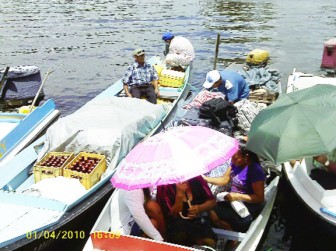Every fortnight, on Sunday, Edith Adams departs Moruka in a small boat powered by a 15 horse-power engine for a trip to Charity that takes up to nine hours.
The boat is laden with cassava bread and casareep which she sells at the Cinderella County’s famous Monday Market. It is a risky journey during which the small craft must encounter the treacherous waters of the Atlantic Ocean;
but Edith has grown used to the risk. It forms part of a tough and demanding enterprise in which she has been engaged for more than ten years.

Edith is thirty-something, a resident of Moruka, mother of three school-aged children and for the most part a single parent. Her husband, like so many other men and women from the community, has been attracted by what, these days, are the lucrative pursuits of the gold industry.
Edith operates a small shop at Moruka. The cassava bread and casareep which she takes to the Charity Market is sold there and the proceeds are used to purchase consumer goods- rice, sugar, flour, salt, chicken, vegetables and household items – to stock her small enterprise.
Edith has grown into her business. The demanding schedule does not allow her the luxury of remaining at Charity for the duration of the Monday market. Her selling and buying must begin shortly after she arrives to allow her to depart
Charity by 10 am on Monday for the return journey to Moruka. The tides have their own agenda and her compliance narrows the margin of risk associated with the only form of transport she can use. By the time the small craft arrives back at Moruka it is already nightfall.
Last Monday other boatloads of goods and residents from the North West District arrived at Charity. The Monday Market provides a unique trading opportunity and Edith has learnt the art of making deals. There are other sellers and buyers there, some of them offering the same products for sale and she cannot afford to be unmindful of the competition.
Sometimes, the margins of profit can be wafer thin. The craft powered by 15 HP engines cost $2,000 per passenger and the additional cost for produce is $500 per hundred pounds. In an environment where market forces strictly determine whether a trip has been a good or bad one, Edith has learnt to accept the vagaries of her trade.
The shop at Moruka remains closed for the duration of her trip and her children must, in large measure, fend for themselves.
For Edith, life is light years removed from the more salubrious environment of the urban woman entrepreneur and yet her enterprise, her energy and her understanding of the business she pursues is no less noteworthy than that of her corporate counterparts.
She wishes prices were better. She offers her casareep at $1,000 per litre and cassava bread at $100 each, pointing out that when account is taken of the quality of her products and the costs and risks associated with her trade, she ought to be better compensated. Still, she perseveres. She has no other way of making a living.




